Exposing Click Farms: How to Spot Fake Engagement Fast

Did you know that 51% of all internet traffic is now automated, and 37% of that is malicious “bad bots”? (Imperva 2025 Bad Bot Report) Many of these bad actors support click farms, which are one of the most damaging forms of click fraud for companies and advertisers.
Click farms are groups of low-paid workers (or bots) hired to create fake conversions, likes, reviews, and ad interactions. Their activity drains budgets, manipulates campaign data, and erodes brand trust. According to Spider AF’s 2025 Ad Fraud White Paper, global ad fraud losses reached $37.7 billion in 2024 and are projected to climb to $41.4 billion in 2025. A significant share of that waste comes from click farms and bot farms.
In this article, we explain:
- What a click farm is
- How click farms operate
- Their impact on businesses
- How to detect and prevent click farm activity
What Is a Click Farm?
A click farm is any location where a group of people generates online traffic in bulk, regardless of the intention. This is still a form of click fraud, since the goal is to artificially inflate engagement.
Click farms can be large, organized enterprises with hundreds of workers, or small operations using a handful of tablets and smartphones. They often operate from apartments, hotels, or informal offices. One famous case uncovered by a British photographer in Vietnam showed dozens of phones running around the clock to simulate user activity.
These operations are typically businesses anyone can hire through online resellers. Services may include:
- Generating fake social media likes and followers
- Writing product reviews and comments
- Posting on forums and social media
- Driving traffic to fraudulent websites to inflate ad revenue or SEO rankings
- Creating backlinks to manipulate search performance
Some farms use click bots or full-scale bot farms, where automated systems handle the workload instead of humans. In practice, many operations mix both: manual workers add realism, while bots drive scale.
The Mechanics of Click Farms
Click farms often operate from countries with lower labor costs such as India, Bangladesh, Vietnam, and the Philippines. Workers or bots generate various forms of internet traffic from centralized locations.
For example, an operation uncovered in Central Asia was found running tens of thousands of fake Instagram accounts. These accounts liked posts, followed profiles, and even published their own content. To avoid detection, operators used proxy servers, IP rotation, and thousands of local SIM cards.
Bot farms often rely on botnets, large networks of compromised devices programmed to mimic human browsing behavior. These botnets allow clients to request specific actions—such as clicks from a certain geography or likes on a product page—giving the illusion of genuine engagement.
Impact of Click Farms
On digital marketing campaigns
Click farms warp advertising metrics. In some cases, up to 14% of clicks on SME ads are non-genuine, leading to wasted spend and distorted ROI, CTR, and conversion rates.
On business reputation
Fake reviews and comments undermine consumer trust. A recent survey found that 81% of US consumers are wary of fake reviews, making it harder for authentic customer feedback to stand out.
On analytics and decision-making
Fraudulent traffic produces misleading insights. Marketers risk doubling down on ineffective strategies because performance data looks stronger than it really is.
Detecting Click Farms
Learning to detect click fraud is crucial. Warning signs include:
- Sudden traffic spikes from unexpected geographic regions
- Abnormally high bounce rates and very short session times
- Large volumes of clicks with little or no conversions
Unfortunately, farms that employ real people are harder to detect because their activity resembles authentic user behavior. This is why businesses need automated protection. Tools like Spider AF monitor traffic in real time, analyze anomalies, and block bad actors before they consume more of your budget.
Preventing Click Farm Activity
1. Monitor and analyze traffic
Actively review traffic sources, bounce rates, and engagement patterns. Look for unusual spikes or unexplained surges.
2. Use verification systems
Deploy CAPTCHAs—especially behavioral or graphic-based versions—to block bots. Multi-factor authentication helps stop fake account creation.
3. Refine targeting criteria
Regularly adjust campaign settings by interests, behavior, and geography. Update allow and block lists to minimize exposure.
4. Employ advanced anti-fraud tools
With fraud consuming billions of dollars annually, investing in real-time protection is essential. Spider AF PPC Protection blocks invalid clicks across Google, Meta, Microsoft, TikTok, and other ad networks, while providing transparent reporting.
Bottom Line
Click farms have grown more sophisticated, often blending human workers with advanced automation to evade detection. The result is wasted ad spend, distorted analytics, and brand credibility damage.
The best defense combines active monitoring, refined targeting, stronger verification systems, and advanced solutions like Spider AF.
👉 Don’t let click farms drain your budget. Start your free trial of Spider AF PPC Protection and ensure every click comes from a real customer.
Frequently Asked Questions About Click Farms
What is a click farm in digital marketing?
A click farm is an organized group of people or bots paid to generate fake online engagement, such as clicks, reviews, or social media activity. The goal is to artificially inflate metrics and extract advertising revenue.
Are click farms illegal?
Click farms operate in a gray area. While not always explicitly illegal, they violate advertising platform policies and can be tied to fraud, identity theft, and misuse of stolen payment methods. Advertisers impacted by click farm activity may also have legal grounds to pursue damages.
How do click farms affect businesses?
They waste ad spend, distort ROI and CTR metrics, and damage brand trust with fake reviews and interactions. According to Spider AF’s 2025 White Paper, ad fraud—including click farms—is expected to cost advertisers $41.4 billion globally in 2025.
How can you detect click farm activity?
Red flags include sudden traffic spikes from specific regions, high bounce rates, and large volumes of clicks without conversions. Fraud detection tools like Spider AF provide real-time monitoring to flag and block suspicious behavior.
What is the difference between manual click farms and bot farms?
Manual click farms use low-paid workers to generate traffic, while bot farms rely on automated scripts or botnets to do the same. Many operations use a hybrid of both to maximize scale while appearing more human.
How can businesses prevent click farms from targeting their ads?
The most effective steps include using CAPTCHAs, refining targeting criteria, updating allow/block lists, and adopting advanced anti-fraud solutions like Spider AF PPC Protection, which blocks invalid clicks in real time.



















